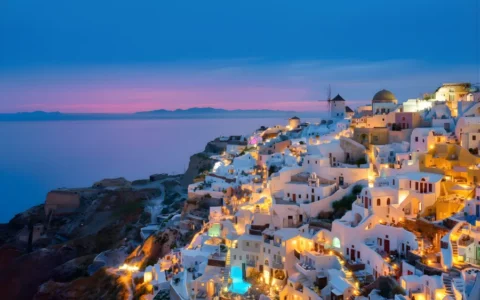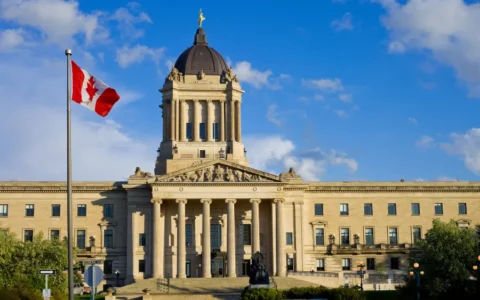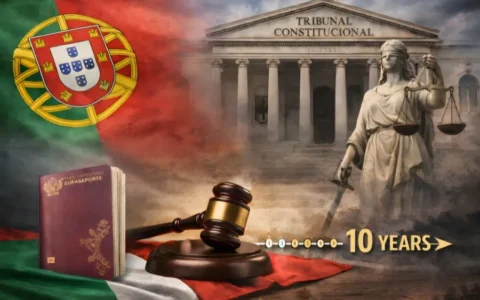Elodie Lamer and Nana Ama Sarfo of Tax Notes discuss the tax implications of golden visas and passports, which allow affluent foreigners to receive residency or citizenship in exchange for a minimum level of investment.
This transcript has been edited for length and clarity.
The idea of immigration often conjures up black and white images of huddled masses on ships in New York Harbor. People seeking new opportunities to make their fortune.
But what happens for people who’ve already made their fortune and don’t have time to wait in line for the normal process? And what about the growing class of remote workers who don’t need to be physically anywhere?
This week, we’re talking about golden passports with Tax Notes reporter Elodie Lamer and Tax Notes contributing editor Nana Ama Sarfo. Elodie, Ama, welcome to podcast.
Elodie Lamer: Hi, thank you for having me.
Nana Ama Sarfo: Thanks, Dave. It’s really great to be here.
David D. Stewart: Why don’t we start off with: What are we talking about when we use the term golden passport or golden visa?
Elodie Lamer: Yes. I think there is a distinction to be made between golden passport and golden visa.
Golden passports grant you citizenship in exchange for an investment. It can be different kinds of investments. For example, in Cyprus, you have to invest in the investment fund or buy a house or a share in a company.
Golden visa is about residency, so it grants you residency rights if you do the same kind of investment.
There’s a big difference in the EU because once you get citizenship in an EU country, you get EU citizenship, which means that you get many rights. The right to settle anywhere in the EU, the right to work, the right to move freely, and the right to vote or even run in local and EU elections. So, it’s a big issue for the EU.
Residency is a bit different because you get residency in an EU country and then you can move freely, but you don’t have the same rights, like settling or working anywhere else.
Nana Ama Sarfo: When we talk about golden visas, often the threshold for getting temporary or permanent residency is usually much lower than with a golden passport.
Elodie Lamer: If I may add, as the European Commission sees it, it’s really a shortcut to citizenship or residency. You can get it without having any genuine link with the country and that’s an issue for the commission.
David D. Stewart: All right. Ama, why do countries offer these?
Nana Ama Sarfo: Well, Dave, countries want investment. They want wealthy investors pouring money into their infrastructure and into their economies. These golden visa and golden passport programs essentially are a way to guarantee that, because investment is mandatory for receiving the residency or citizenship benefits that these investors seek.
Elodie Lamer: In the case of Cyprus, for example, they started it just after they went through the crisis and the eurozone bailout. According to Al Jazeera, who made an investigation in this in 2020, between 2013 and 2020 they had €8 billion in revenues.

David D. Stewart: Now, are there any countries, other than Cyprus, that are known for these golden visa programs?
Elodie Lamer: On golden visas — residency — there are actually a lot of countries, but it doesn’t mean that conditions are not strict. For example, Luxembourg offers this kind of residency by investment program, but the conditions are much stricter.
On golden passports — citizenship — you still have Malta. Cypress and Bulgaria recently told the commission that they would abolish it. Malta is still in a legal battle with the commission because the commission says we want it removed in the next two months.
Nana Ama Sarfo: Well, I would add that countries all over the world have both of these programs, I think in just about every continent except Antarctica.
But I think that when people think about golden visas and golden passports, they often think about countries with very large tourism markets, like the Caribbean countries, Thailand, and Greece.
David D. Stewart: What sort of individuals are taking advantage of these golden visa or golden passport programs?
Nana Ama Sarfo: We see that there are wealthy individuals in countries who want investment certainty and might not be able to get that domestically due to economic or political instability. Oftentimes those sorts of high-net-worth individuals will seek a golden passport or golden visa program.
During the height of the pandemic and lockdown, we saw wealthy individuals, in countries where it might be difficult to obtain a foreign visa to travel, seeking these sorts of programs because they wanted to ensure that they could have continued access to the world for personal or business reasons. They want a passport that facilitates easier travel.
We also see other wealthy individuals who want to lower their tax burdens. They want to perhaps find a jurisdiction where they don’t have to pay wealth or inheritance taxes and that becomes a motivating factor for seeking a program.
Of course, on the other hand, you also have individuals with ill intention. People who are tied to organized crime or other illicit activities who perhaps want to launder their money and see these investment programs as a way to do so.
Elodie Lamer: Coming back to the Al Jazeera “Cyprus Papers” in 2020, their investigation showed that there were people being accused of corruption in a telecom deal. The former boss of Gazprom, Nikolay Gornovskiy, who was wanted for embezzlement. People who were wanted in Ukraine but were not there to answer the charges because they were somewhere else thanks to their visa or passport. Any kind of criminals or even politically exposed persons.
It also showed that a relative of the Bin Laden family was amongst the beneficiaries, so all kinds of people.
What this investigation showed also is that there was a condition that said, “You have to have a clean criminal record,” but that was never really respected in many cases.
David D. Stewart: I take it that there are corruption issues. Are there other downsides to golden visa or golden passport programs?
Elodie Lamer: Well, from the EU perspective, the commission, even the EP calls it a Trojan Horse, because it’s one thing to grant residency or citizenship and have bad consequences for you, but when you do it in an EU member state, it means that it has consequences for all the EU member states. When you give citizenship, you give rights in every member state. It has consequences for all the EU.

Nana Ama Sarfo: I would also add that sometimes the optics can be negative for governments in giving everyday citizens the impression that their governments are focusing their energies on essentially courting the 1 percent and giving them these plump economic opportunities, instead of trying to essentially spread the wealth and offer economic opportunities to people across all sorts of economic backgrounds.
David D. Stewart: What are the tax implications for individuals taking on these golden passports and golden visas?
Elodie Lamer: According to a 2018 study by the European Parliamentary Research Service, apart from giving those individuals access to a specific tax regime, one of the issues is the possible circumvention of the common reporting standards.
Basically, if you have a foreign bank account and have residency in the country of the bank, you can just tell the bank that you live there. The bank doesn’t know it has to give the information to the tax administration of the country where you really live. So, it’s a possible circumvention of this common reporting standard and the exchange of information.
The commission recently said that it would try to make sure that the directive and administrative corporation for tax matters were well implemented and that it was considering infringement procedure if it’s not well implemented specifically to tackle this possible circumvention of the Common Reporting Standard thanks to golden visas.
David D. Stewart: Now I understand that the EU is putting some of these programs under scrutiny. What is the EU saying its concern is here?
Elodie Lamer: In the EU, there is some sort of systematic fight against mostly golden passports. As I said earlier, it has consequences for the whole EU because it gives you the right to work and settle anywhere in the EU.
The commission saying that it is granting citizenship in exchange for an investment without any genuine link to the country is actually not compatible with the principle of sincere cooperation that is enshrined in EU treaties. It also undermines the integrity of the statues of EU citizenship. The commission wants it to stop. So it is in a legal battle with Malta right now.
In April, the commission told Malta, “You have two months to just get rid of this scheme.” The Maltese press says that the government is considering failing out the scheme or just reforming it. We don’t know yet what they will do. The commission will probably bring the matter to court if Malta doesn’t act in time. It would be the first time that this would be tested in court.
The commission has looked for a way to attack those schemes for a very long time. They found legal grounds, the one I just described, but it has never been tested in court so we don’t know what the Court of Justice of the European Union might say on this. Obviously I guess they would rather avoid this. Let’s see what Malta is going to do.
On residency, there are many domains in which the EU is trying to act because the EU doesn’t have the competence to tell member states what they should ask for before granting residency. Basically, there’s a proposal now from the commission from a few weeks ago that says that you really have to monitor that someone is actually living in the country before granting residency.
There’s also another piece of legislation that is being negotiated in each institution. Each institution has to form a negotiating position and in the Parliament, in the new anti-money launderingregulation, they also introduced stricter provisions on residency. I don’t know if it will fly with member states.
The last thing the commission has said is that countries which granted citizenship or residency to Russians or Belarusians close to Putin or the Kremlin should just revoke it. Malta has announced that it has done it.
David D. Stewart: Since the pandemic has changed just about everything, how has that affected the golden passport, golden visa area?
Nana Ama Sarfo: Well, there’s been a really significant increase in the number of people looking for golden passports. I think particularly golden visas.
As Elodie had mentioned, these sorts of programs are especially important in times of economic stress. Whenever there’s any sort of financial crisis governments look to how they can offer these sorts of packages for outside investors.
What we saw during the pandemic was that there was a very strong allure for people living in countries that had weak passports, as I had mentioned before. There’s one particular firm, it’s London-based Henley & Partners, that helps clients navigate these programs.
They found a 25 percent increase in inquiries from high-net-worth individuals asking about golden visa programs. They found that a lot of these inquiries were coming from emerging markets like India, Pakistan, Nigeria, and South Africa.
They also found that they were fielding a lot of inquiries from individuals in developed countries too. They were getting a lot of inquiries from people based in the United States and Canada.
Because again, people are looking for opportunities to diversify their investments in times of economic downturn and also position themselves to be in a place where they have the broadest access possible to global markets.
David D. Stewart: Is there any additional benefit to allowing these people that you referred to in one of your stories as “digital nomads?”
Nana Ama Sarfo: Yes. Digital nomads are highly mobile workers. Essentially, I think most office workers who are working remotely could find themselves becoming digital nomads if they decide to travel and work remotely from a sunny beach location.
In the case of digital nomads, you have a group of highly mobile workers who are traveling with money, and governments want those workers to spend money in their countries. They’re not necessarily wealthy workers, but governments know that they have funds.
What you’ll see across the board is that digital nomad visa programs will ask applicants for proof of employment, or if they’re unemployed, proof of savings or other income, and that they’re imposing minimum income thresholds requirements to make sure that these people actually can contribute to the local economies once they do land.
But that being said, I think we are beginning to see a bit of a backlash to the work-from-home trend. If people do increasingly return to the office on a full-time basis, we’ll see if these digital nomad programs have any sort of staying power. But for now, there definitely does seem to be a benefit and governments are pursuing them.
Greece has a program. I believe the Bahamas has a program as well.
David D. Stewart: Well, this is definitely going to be an interesting space to watch as it develops over the next few years. Elodie, Ama, thank you for being here.
Elodie Lamer: Thank you for having me.
Nana Ama Sarfo: Thanks so much, Dave.






